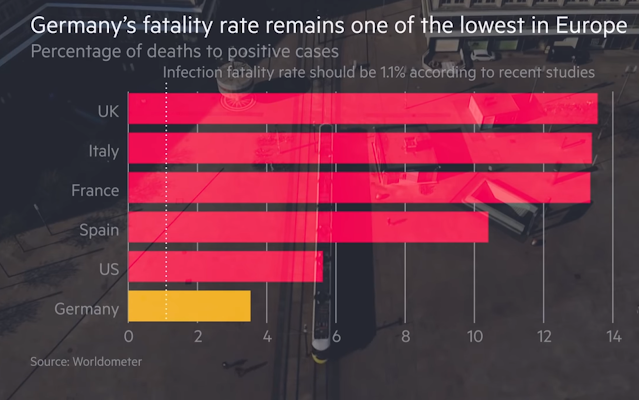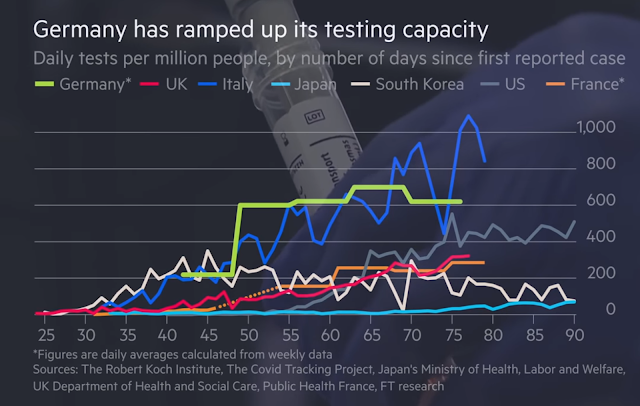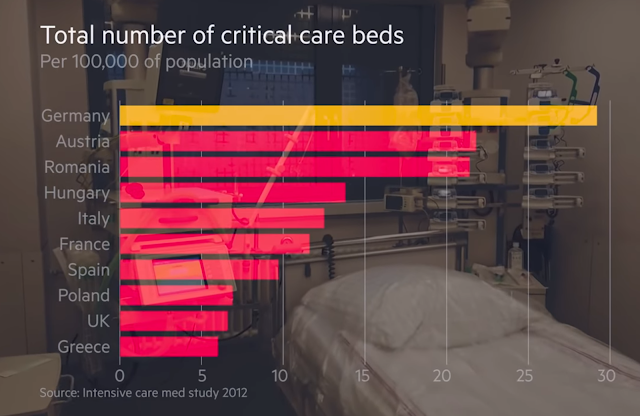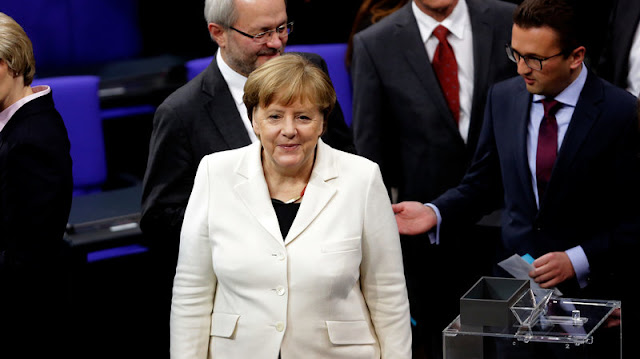What we could learn from Germany to fight against COVID-19 Pandemic
The lesson from the German system of controlling COVID-19
The COVID-19 outbreak traveled to Germany on January 19th when a businesswoman from Shanghai visited for two days of meetings near Munich with her German partners. After she was diagnosed a few days later her contacts were quickly traced and tested and the first cluster of infected Germans was identified and isolated. And she infected this man infected, five others and in the end, they had 16 patients. And then very soon nothing happened.
In
Germany spring break arrived. With the arrival of spring break many German and
Italian students made their way to the Alpine villages of Austria for skiing. Which
turns out there was one super spreader. In the town of Ischgl, a bartender who
thought he had a cold was not ill enough to skip work. He infected hundreds of
young people including many Germans.
There
was not yet an understanding of what could happen. Up to 50% of people who have
the virus didn't show any symptoms at all and the very large number of people
show only very mild symptoms. This was the very initial situation in Germany.
In
such a situation, it depends on the capacity of a country to test how many people
can come to tests per day in order to isolate the people that are infected, to
isolate them from the rest of the healthy people. That's what actually had
happened in Germany.
Chancellor
Angela Merkel, a scientist by profession was the first Western leader to take
action about COVID-19. She estimated that up to 70 percent of the German
population could contract the virus. Germany quickly began developing thousands
of test kits. Far more than any other Western country. German authority has
ramped up quickly and is now they are testing 500,000 people every week.
They
executed compact safeguards and care measures, for instance, everybody came in
from Italy or skiing or from the risk area in Italy all were kept isolated and
were tested everybody surrounding. Their families were also kept isolated. This
led them to the point that they don't have so many old people getting infected.
If
we look at the overall positively tested population in Germany(Data of Robert Koch Institute), we see much younger
people below at the age of 60 who have been tested positive and therefore, they
have not so many severely ill people in their population.
If
the wave of infection again arrives even massively, Germany will be far better
prepared than other Western countries to handle it. For example, Germany has
invested in a greater per capita proportion of intensive care beds and
ventilators. Almost three times as many as Canada and four times as many as
Italy.
In
Germany, there are a lot of hospital beds per capita and a lot of ICU beds per
capita. For example, in Germany, they have 34 ICU beds per 100,000 population.
The ratio is higher in comparison to other countries. For comparison, in Italy,
they have 8.4 per 100,000 and. So, they can handle the situation a little bit
better than the Italian government could do.
Many
German experts feel that the country's low fatality rate of COVID-19 patients
has a lot to do with the relatively low number of serious cases they are
dealing with. Right now, Germany has many fewer COVID-19 deaths per capita
compared to its neighbors. Almost 7 times fewer than Franc, 30 times fewer
than Spain and 35 times fewer than Italy.
 |
| The death rate in European Countries |
Many
experts, medical professionals, and leaders in Germany claim that their
comparative control over coronavirus in Europe does not lead to
overconfidence. Chancellor Angela Markel
said that they are not becoming overconfident at all. They are very well aware
that in a couple of weeks they may be in big trouble if they will not maintain
strict hygiene and social distancing in their returning social and professional
life.
But
one thing is sure that it has seemed Germany has a good determination to win
the battle against this virus. Germany has given the world a positive lesson on
how to deal with this pandemic.
The whole world is yet in trouble and locked to stand out from the devastating
corona pandemic. But one particular country, Germany stands out in comparison
to its neighbors. It has also a very large number of infections only the US,
Spain and Italy have more. but while looking at the ratio of deaths to
confirmed cases, Germany has a low rate. It is only about 3% compared to 13% in
Italy. So, Germany has achieved a kind
of success over the global pandemic. So how has it achieved that there are a
number of factors responsible;
First: Testing
Germany
has tested far more people than other countries. That has allowed authorities
to slow transmission of the disease by isolating known cases while they are infectious. It also means patients receive life-saving treatment in a timelier
manner. So, for example, that can be put on ventilators before their condition
deteriorates.
 |
| Testing Capacity of Major Developed Countries |
Second: Bed and Equipment/Public Health Care System
Germany
has a lot of more intensive care beds than other countries. At the start of the
crisis, it had 28,000 and has increased that to 40,000. 10,000 of which are
currently unoccupied. It also has not seen the kind of shortage of critical
equipment like ventilators but has been seen elsewhere. At the start of the
pandemic, it ordered 10,000 of them.
 |
| Number of Critical Care Beds Per 100,000 of Population in European Countries |
Third: The Government/Good Politicians
Germany
has good leaders and a smoothly functioning government. Angela Merkel the
Chancellor has communicated clearly and calmly throughout the crisis and has
been rewarded with soaring approval ratings. She has imposed ever stricter
social distancing measures on the population but done so in a measured way
coordinating closely with the leaders of Germany's 16 regions but she has
self-stresses that there is no room for complacency.
 |
| German Chancellor Angela Merkel |
They
have succeeded somewhat in slowing the spread of coronavirus. The German
authorities set far too early to give the all-clear that can only happen once
a vaccine has been found. Germanys health care system works better than others
and considered one of the bests in the world for long.
Europe's biggest economy is getting back to business. German authorities have allowed
reopening restaurants, schools, shops, departmental stores, and also
professional football with closed-door again after almost 60 days of lockdown.
Germany's professional football league the Bundesliga has resumed matches from
16th May and is heading with closed doors until the virus will come
into control.
There
are important cautions like people here can't simply go out now and meet up
with whoever they would like. They still have to wear face masks on public
transport and in shops and the authorities will continue to test and contact
trace aggressively. They have made the provision that if infections rise above
a prescribed limit anywhere in this country the local authorities will be
required to immediately reimpose restrictions.
They
are well prepared for any of the circumstances and they are well known for the first phase of the pandemic behind it but the federal government warned that a long battle with the virus still lies ahead.
Germany
is the perfect example of a collaborated and coordinated effort of the federal
governance system with determined public investment in social overhead like health,
education, and transportation and which helped them to get success over the
fight against coronavirus more effectively than the capitalist countries.
With the planned and goal-oriented public investment in health sector as well as other social overheads, responsible partnerships from/with the private sector, determined and wish politicians and supportive as well as educated citizens, the nation could achieve many more complex types of things. Cultural development and will for the public benefit may lead the nation towards a welfare state.







i love reading this article so beautiful!!great job! custom lanyards
ReplyDeleteReally enjoyed this article post. Really thank you! Will read on... same day results covid testing near me
ReplyDelete